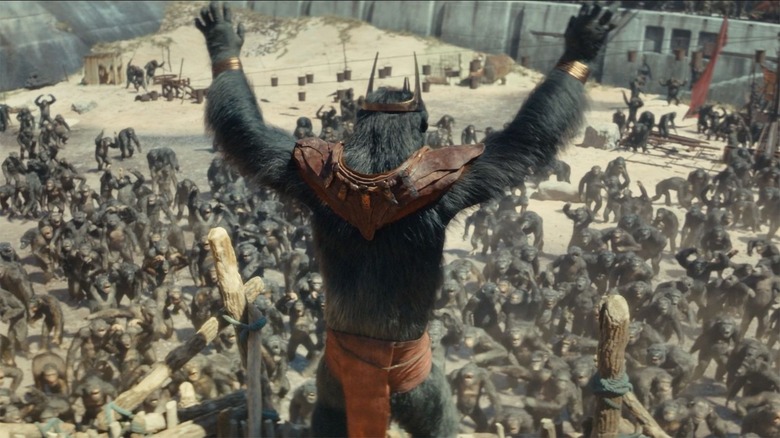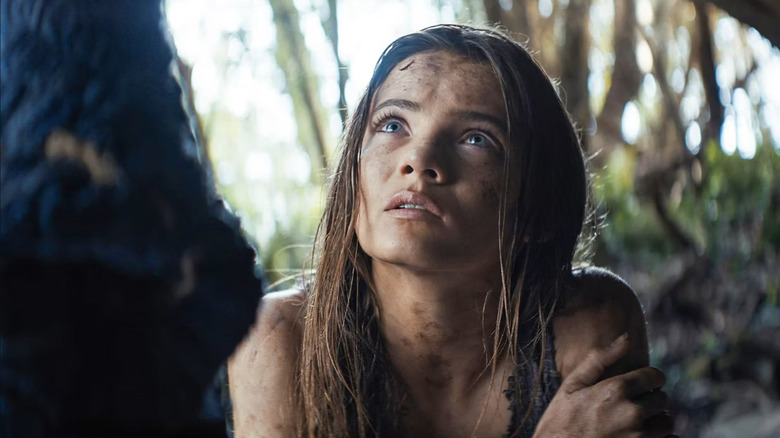Kingdom Of The Planet Of The Apes Almost Had A Much Darker Ending
This article contains spoilers for "Kingdom of the Planet of the Apes."
At the end of the "Kingdom of the Planet of the Apes," Mae (Freya Allan) returns to the Eagle-raising ape clan to say farewell to Noa (Owen Teague), telling him that humans should be allowed to return to their position as the dominant species. Noa tells her that doing so would stifle the freedom the apes are currently experiencing. The metaphorical genie can't be put back in the bottle, so to speak. But then the audience sees that she's holding a gun behind her back. It's a chilling moment reinforcing the tyrannical Proximus Caesar's belief that Mae is looking out for humans and no one else. It's a shock to the system considering everything the two have been through, and it also leaves the ending up to interpretation. Was she there to kill him? Was the gun a matter of defense in case she was threatened? "Kingdom of the Planet of the Apes" does not provide direct answers, and the film is genuinely great because of it (check out our review here).
In fact, The Hollywood Reporter had similar thoughts about the ending and asked Freya Allan about it. As it turns out, the ending was originally scripted with a much darker intent proudly on display. "Originally, you actually see her pull the gun on Noa, but his back is turned to her," Allan explained. "And so you think, 'Oh my God, is she about to shoot him?' And Mae is crying as she's doing it, like, 'Am I about to shoot him?' And then she doesn't. The minute he mentions Raka's name, she puts the gun down."
The ending was changed to the subtle, smarter ending we see in the final product, which Allan also said she preferred.
The ending allows the audience to ask questions
Media literacy has been on a stark decline as of late, and while there have always been those who struggle with incorporating critical thinking to the media they consume, it's only been recently that those in control of making entertainment have begun to make decisions based on the assumption that a huge chunk of the population "won't get it." "Frasier" is a "Cheers" spin-off, but had the show debuted in 2024, it likely would have been called "Frasier: A Cheers Story" or something. Now that audiences have the ability to review-bomb films with "I don't get it" reviews, safe, algorithm-appeasing stories with easily digestible answers presented on a silver platter have become the story du jour. "Kingdom of the Planet of the Apes" resisting the siren call of the obvious ending speaks even more to the film's strengths.
"It's so much smarter and really allows you to think more. It doesn't need to be as obvious as holding up the gun, and it allows you to raise the questions [the reporter] just asked: Was she going there to kill them, or was it a precaution? So that's up for you to decide because the scene that I shot was so different," Allan said. "In the scene that I shot, Mae was going there to kill him because he scares her — his intelligence scares her." Allan also said that Mae didn't want to kill Noa, but felt that she had to, but couldn't. All it took was some clever work in the edit bay, and "Kingdom of the Planet of the Apes" was given the better ending for this chapter of the story.
"Kingdom of the Planet of the Apes" is playing in theaters everywhere.

